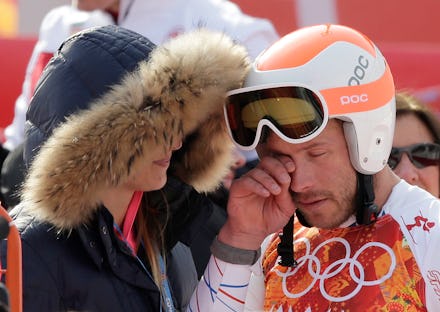Why the Bode Miller Interview Wasn't Insensitive — It Was Good Journalism

On Sunday, American Bode Miller tore across the finish line in the men's super-G skiing event to tie for the Bronze medal in Sochi. This victory made Miller the oldest alpine skiing medalist in history, which he could add to his already highly-decorated career. Like with most racers, Miller did a post-race interview to discuss his personal take on his victory. In his post-race interview with NBC correspondent Christin Cooper, Cooper asked Miller about his brother who died last April of complications from a motorcycle accident. After a few questions about his brother, Miller collapsed in grief, slouched against the railing as his wife moved to comfort him.
Cooper and NBC have been roundly criticized for the interview. Reports on the event say that Cooper "egged" Miller on. After the interview, Reid Wegley of the Huffington Post accused NBC of being "an aging media network grasping for human drama to drive its ratings and social media metrics." The New York Times claimed NBC "pushe[d] too far." Even NBC's own anchor Brenda Wood ranted about Cooper's interview, saying that she "goaded him" and that her apology was "disingenuous."
If you haven't watched the original video, do so before making judgments. It's important to understand what transpires here, because it seems like most people haven't actually watched it first hand. Notably, Miller is the one who broaches the subject of his brother's passing and when he does, Cooper's voice immediately goes from pointed and professional to gentle and understanding. To say that Cooper "egged" Miller on or "goaded" is a brutal misinterpretation of what actually happened. It's clear from their exchange that Cooper isn't goading; she's coaxing. She's asking.
Cooper has a few defenders, but none of them are doing a very good job. Some give a proverbial shrug and say, "that's TV." Others chime in with the school child's defense of "everyone else is doing it!" One writer for the Denver Post even argues that Cooper is a "good woman," which I'm sure is true, but it does not get to the heart of the issue, which is that Cooper was being a good reporter in attempting to get a picture of Miller's feelings.
It is Journalism 101 to draw all the details you can out of an interviewee. This isn't necessarily a heartless attempt to extract information from the person you're talking to, but rather a way to help them give their full story. After all, Miller and other people who agree to an interview do so voluntarily, so we assume they have something they want to say. It's the reporter's job to help get their story out. Part of that is asking follow up questions when the person (perhaps unknowingly) offers a vague answer. It was Cooper's job to get Miller to be specific about his brother, particularly since he brought it up.
Some have criticized NBC for needlessly honing in on human drama in the Olympics to "improve ratings." This is an overly dramatic demand that fails to capture the real complexity of journalism. Life isn't figures, race times or obstacles dodged. Those things are facts, and anyone can deliver them. Reporters, in contrast, bring those facts to life. They capture the nuances of a situation and, yes, the emotions of the people involved, as they are essential to fully understanding the moments and those events.
Imagine if reporting of events in Syria were contained to the facts of the engagements, the number of dead and the refugees killed. If reporters did not strive for a basic understanding of the situation on a human level, we would have a greatly depleted understanding of the reality of what was happening there. The necessity for full understanding extends to the Olympics as well — or is everyone tired of @Sochiproblems and the ongoing coverage of stances for LGBT rights in Russia as well?
It is, of course, important to know that Bode Miller himself can find no fault with Christin Cooper or NBC. The day of, Miller sent out several tweets in defense of Cooper:
And the most important one:
He has also defended her in several interviews he has since given:
I've known Christin a long time. She's a sweetheart of a person. I know she didn't mean to push. I don't think she really anticipated what my reaction was going to be, and I think by the time she sort of realized, it was too late. I don't blame her at all. I feel terrible that she's taking the heat for that because it really — it was just a heat of the moment kind of circumstance.
With these statements, Miller hits on a truth that should be obvious to anyone who has grieved: It affects everyone differently, and Cooper had no way of knowing how strongly Miller was going to react. Many times, the griever doesn't even know, and I suspect that Miller didn't when he initially brought up his brother. Grief is unpredictable. Sometimes, something very small can trigger it, and when it grips at your heart, it squeezes tightly, and there's nothing to do but ride it until it decides to let go. Some people can push through to speak of those they have lost — many want to do this and need the help from a reporter to put their thoughts together. Others will ask to not talk about it.
Bode Miller both initiated the conversation about his brother and chose not to push the interview in another direction. That he collapsed in grief indicates nothing more than the heart-wrenching nature of losing a loved one and how quickly grief can take hold.